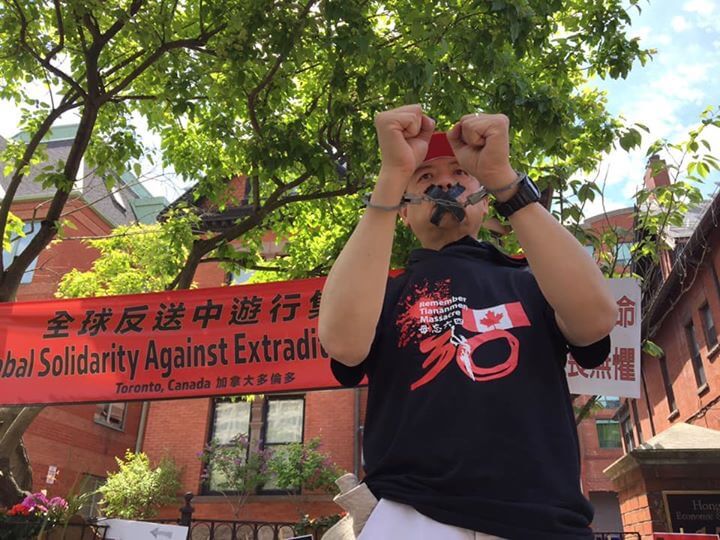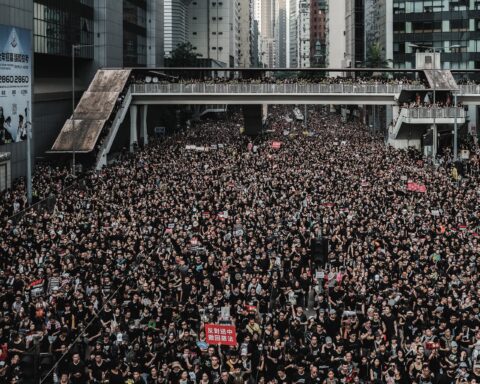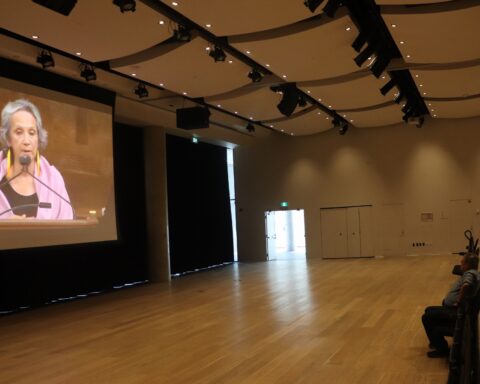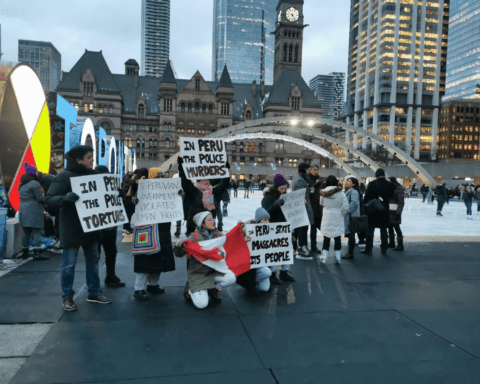The months-long Hong Kong protest against the already-dead extradition bill has inevitably spread to Canada: a popular immigration destination for tens of thousands of Hong Kongers.
What’s your colour? Yellow or blue? The short question has caused polarization amongst almost eight million people in Hong Kong. It now has its ripple effect among about a quarter million Hong Kong immigrants here in Canada.
Yellow stands for pro-democracy; while blue is pro-Beijing and Hong Kong SAR (Special Administrative Region), which supports alleged Hong Kong police brutality.
Every Hong Konger has a position, that sometimes goes against family, friends, marriage, and other social relationships. Being quiet is not necessarily indifference to politics. It is a matter of about deterring a family feud.
Family feuds
Miranda Tsui is one of those affected. “I have to un-friend three of my brothers on Facebook, “she stated.
A former university teacher, Tsui immigrated to Canada in the early 90s but only settled here ten years ago. The Tsuis grew up in Hong Kong’s challenging development and expansion era of the 60s. Half a century later, they hold different citizenships in western countries and lead well-off middle-class lives.
“Both of my brothers support Hong Kong police violence and the extradition bill,” Tsui explains. “I told them I have to block them on Facebook, so I don’t have to see so many of their posts and re-posts that agitate me.”
One of the points one of her brothers raises is that the government should have taken full control of its own funded Radio Television Hong Kong so they could have controlled the media coverage.
Tsui is bitterly puzzled that someone like her brother who lives in a western country and enjoys its democracy could ask for ban on the freedom of speech in his birthplace.
“Some people tend to think issues in Hong Kong is very complicated,” she said. “They think the leader from Beijing is doing a good job and making the economy boom; (that) the protests are funded and fueled by foreign agencies. This is ridiculous.”

“I attended one of the protests in downtown outside the Consulate General of China in Toronto last June,” stressed Tsui. “I’m very much sure that me and other protesters came out on our consciences, not by any ‘foreign influences.’“
“We are still family,” she says. “We can talk about anything, but just not politics at all.”
A people divided
Toronto political commentator Andrew Lee, also an immigrant from Hong Kong for more than two decades, even heard of couples’ relationships being estranged after the eruption of the protests. “No divorce yet, but in tension,” he says.
Lee was very active on social media when the protest started, sending posts daily on Facebook and WhatsApp groups.
“I can see Hong Kongers split half and half; and (each) stand for their point of view, regardless of their education level or age group,” he says. “I have never seen Hong Kong people so divided before.”
Lee explains that the split in the community shows people’s mentalities. The so-called “Blue Ribbon” carries a nationalism mindset. They want to see Hong Kong stable thanks to China’s strong economy.
Yellow Ribbon, on the other hand, refers to protesters who defend basic human rights, freedom of speech and democracy under Hong Kong Basic Law. They support “One country, two systems” constitutional principle by Beijing, but refuse China’s interference in the Basic Law.
The previously proposed extradition bill, if enacted, would have allowed mainland Chinese local authorities to detain and extradite Hong Kong citizens to Chinese jurisdictions. Given the differences between two legal and judicial systems, protesters fear the bill will undermine the autonomy of Hong Kong and its citizens’ rights.
“I would say I am a Hong Konger Canadian with Chinese heritage, instead of a Chinese,” Lee adds. “Some of us forget what’s the main reason that makes us immigrate to Canada.”
A silent majority
Similar to Lee, Hong Kong immigrant and media professional Jane Ng indicated at the beginning of the interview that she can only speak for herself.
“On this issue, every Hong Konger has his or her own opinion,” she stated. “No one voice that can represent them.”
“Despite the society being divided and polarized, the majority is still staying silent,” Ng said. “They won’t oppose democracy, but they don’t like the weekly violent protests. Ironically, they stay silent because they don’t want their opinion being labelled. Freedom of speech, in this sense, is limited.”
Ng also reveals that the reason behind her silence is that “my circles basically do not talk about Hong Kong. I think we choose to shut up because we don’t want to argue. I do have friends who want to push their yellow or blue thoughts into the group chats. The rest of the group members simply didn’t combat their views.”
“I am one of the silent majorities,” she explains. “In my family, I have one yellow-ribbon brother and two blue side brothers. Out of respect to each other, we simply let each other express but don’t troll to cause an argument. Because of such mutual respect, my family group is quite quiet on Hong Kong issues.”
What concerns Ng the most is, “the hatred between the protesters and the police, and the hatred between the yellow and the blue” that polarizes the whole population.
Shan is a photojournalist and event photographer based in Toronto with more than a decade of experience. From Beijing Olympic Games to The Dalai Lama in Exile, she has covered a wide range of editorial assignments.





